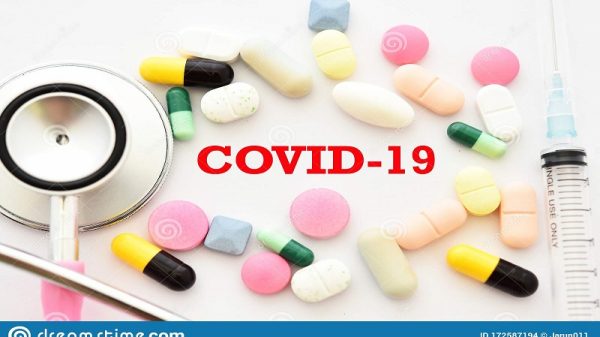Resistance to Antibiotic: An Ignored Enemy at COVID-19

The COVID-19 (Coronavirus Disease-19) pandemic has already brought the world to its knees. Although the world is busy combating the obvious enemy, our other arch nemesis is rising stronger than ever before during this pandemic.
It is a threat with the ability to kill in greater numbers than any other human-known diseases once it reaches its peak. It’s something we’ve been hiding all along, shielding ourselves from our mistakes and ignorance. Bacterial Resistance to antibiotic, or simply known as antibiotic resistance, is this menace that we are facing.
Antibiotic resistance is a phenomenon where a germ becomes resistant to the antibiotic treatment. Here, a germ can be a virus, a bacterium, a fungus or a parasite. Microbes have the ability to store information about antimicrobials in their genes. They use this knowledge to mutate and upgrade their defense to become stronger than the drugs used to kill them.
The question that arises foremost is- when does this resistance develop? Injudicious use of antibiotics leads to the development of resistance in the germs, when they are prescribed irrationally without proper indication of the drug. Using broad-spectrum antibiotics too frequently is yet another reason. The relation between antibiotic usage and resistance has been proved by research. It is seen that countries with higher per capita antibiotic consumption have higher incidence of resistance.Studies also show that almost 20-50% of all the antibiotic treatments are either inappropriately indicated or questionable, which is a very alarming fact.
Moreover, people often do not follow the prescription of the doctor properly, often stopping the medicine earlier than the prescribed period. Availability of over-the-counter antibiotics has also led to self-medication and excessive use of them. In either case, if a drug is taken for an inadequate period of time or in an inappropriate dose, it eventually results in the development of resistance.
Everyone knows that COVID-19 is a death-threat itself. But very few people realise that it is nourishing something more fatal behind our backs. It has joined hands with antimicrobial resistance in the war against our dear Earth. Let’s have a look at how the present situation is elevating the risk of developing antibiotic resistance.
COVID-19 is a viral disease that greatly weakens the immune system of severely affected patients, making them susceptible to secondary infections by other germs. But it is not possible to test all the patients for coinfections as manpower is already short and focused on managing emergency case. Therefore, antibiotics are being used widely to prevent possible infections as well as for treating critical cases. But the problem is- evidence shows that only a small proportion of the corona-infected individuals truly need antibiotics in reality. Data show that less than 10% COVID patients have secondary viral or bacterial infections, whereas almost 70% of them are receiving antimicrobials as treatment or prophylaxis. That is why WHO recommends not to provide antibiotic therapy to mild or moderate cases, even if confirmed to be coronavirus positive.
There is a lot of uncertainty regarding the process of how the disease actually develops and affects the victim. When the clinician does not have all the necessary information about the pathology of the infection, he or she inclines towards prescribing antibiotics more and more. On the other hand, patients frequently demand prescription of antibiotics in fear of the disease, thinking it would save them from greater suffering and cure them faster. Media reports about a few drugs, allegedly effective in treating COVID-19 without any reliable clinical evidence or trial, have only added fuel to this fire. An example of it is the recent hype about the possible use of Hydroxychloroquine in combination with Azithromycin in treating COVID. News like this also leads to self-medication in people desperate to save the lives of their loved ones.
Telemedicine has abruptly become popular due to the fact that most of the population are locked down in their homes. Besides, seeking healthcare in a hospital is now a risk to health itself. Although consulting a doctor over the telephone or internet is very convenient, it breaks a vital protocol of treating a person, which is to clinically examine the individual with the physician’s own expert hands, followed by carrying out investigations as required. Prescribing medicine while depending on the patient’s words alone tends to lead to the usage of antibiotics more than usual in order to remain on the safe side. There was a recent study that demonstrated that overprescribing is much more common in telehealth visits than in face-to-face visits.
Imagine a situation where a person catches a fairly common and very much treatable disease, for example- consider a simple diarrhea due to bacterial infection. In normal scenario, he would be cured within a week by taking antibiotic. But what if the bacteria are resistant to that particular drug? What if the test report after examining the patients stool shows that the bacteria causing the disease are resistant to every single treatment option at hand? Now, this type of resistant germs is called a superbug. And in such a case, the patient would die from persistent diarrhea that just couldn’t be stopped with the help of any kind of medicine.
The dire truth is that we don’t need to imagine these things anymore. They have become a reality. Superbugs are here now. A report suggests that nearly 23,000 people die each year as a direct result from infections due to resistant microorganisms in United States, while the number of death due to the same cause is around 25,000 in the countries of the European Union. While a few scattered researches have been conducted in Bangladesh with a view to studying antibiotic resistance, there is still a need to unify them to get a clearer and more precise picture of the overall situation.
It is not too late, though it is not early also, to handle the problem with utmost importance. In spite of the major setback in the global struggle to keep antibiotic resistance in check due to the pandemic COVID-19, we must not loosen our grip on the leash. Appropriate and systematic testing of COVID patients with symptoms of possible bacterial coinfections should be conducted to choose the proper treatment regimen as far as possible in the present circumstances. During this battle against COVID-19, only patients with serious symptoms should receive antibiotic treatment. Last but not least, antibiotics should not be consumed at any cost without the professional medical advice. We can surely win over this crisis with great effort and some hope like many others we have overcome before.
The writers are researchers from North South University Global Health Institute





























Leave a Reply